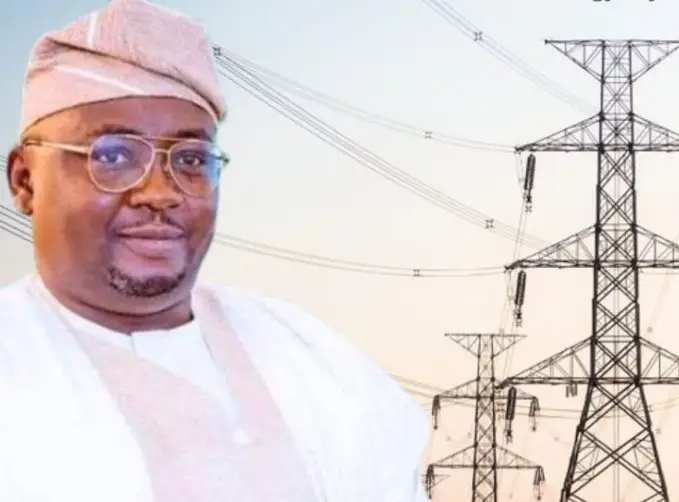Power Minister Adelabu have advocated for the removal of Electricity Subsidy, this is so to enable the liberalization of the sector. He has also given reasons Tinubu-led govt should remove electricity subsidy and has proposed that President Bola Tinubu’s administration ensure removal of electricity subsidy for effective utilisations of energy in the country.
Adelabu said this while expressing concerns over the poor electricity supply situation in the country caused by numerous issues including outstanding subsidy debts.
He advocated that Nigeria should migrate to a full cost-reflective tariff regime if the federal government cannot pay for subsidies owed to the market.
The minister disclosed these on Wednesday when he visited the 750 megawatts (mw) Olorunsogo Power Generating Plant in Ogun State and the 500mw Omotosho Generating Plant in Ondo State as part of his nationwide inspection visit to power installations of the federal government.
Adelabu also stated that the National Independent Power Plants (NIPPs) being operated and managed by the Niger Delta Power Holding Company Plc (NDPHC) were currently suffering under-capacity utilisation of below 25 per cent due to gas supply constants.
“We have been to Olorunsogo and we are now in the Omotosho Power Plant. These are big power plants. I am impressed with the size and the technology of the power plants here. Their operational history is also impressive,” he said.
“And I am amazed at the level of underutilisation of these power installations. Each of them operates below 25 per cent capacity, when we are still complaining that power generation is low in this country. The under-capacity utilisation is due to a variety of reasons.
“The major part of it is the shortage in gas supply to these installations, which is why I needed to see these plants myself, to look at what can we do to improve the operational capacity of these plants.
Speaking about turbines to generate more power for the country, he said, “What can we do to support these power plants to operate at impressive capacity, so that power supply will improve nationwide?”
He said he would later engage with the management of the power companies to effective means of partnership and cooperation such that the federal government could support them to improve their operational capacity, and consequently improve the level of power supply to the distribution companies.
He also observed that the government-owned generating companies were currently undervalued, arguing that a number of works needed to be done on them by the government to bring them back to higher capacity and improved valuation before they could be sold.
Adelabu said if the plants were sold in their current state, the country would be losing, maintaining that Nigeria had invested so much in those power installations that have only existed for 12 years.
In dealing with the gas supply challenge, the minister said there was a need for a roundtable meeting and collaboration with the Minister of State for Petroleum (Gas) in order to ensure that gas supply to the Gencos was regular, and ultimately solve the issue of under capacity utilisation of the plants.
Having said this, Adelabu said Nigeria should migrate to a full cost-reflective tariff regime if the federal government cannot pay for subsidies owed the market.
He said, “And we also want to appeal to the federal government that once there is a subsidy promise, it has to be fully funded. If our government is not ready to fund electricity subsidy, it is actually better for us to migrate to a fully-cost-reflective tariff, because liquidity is a major issue in the sector, which has led to a huge debt being owed power generating companies.
“And once they are owed, they are also unable to pay the gas suppliers. When the gas suppliers are not paid, they will be unwilling to supply regular gas to them.
“So where are these debts piling up? Where are they coming from? Part of it are the Discos are owing some portion of these debts while the federal government is also owing a huge portion of these debts, which relate to the unfunded portion of the subsidy that they pledge.
“So, I will do everything within my capacity. I have already had a meeting with the Honourable Minister of Finance and Coordinating Minister of the Economy as well as the honourable Minister of Budget and National Planning, and the Special Adviser to the President on Energy, on how we can fund the outstanding electricity subsidy unpaid by federal government.”
Meeting with co-ministers
He said the meeting with the relevant ministers would continue on Thursday, noting that they were to discuss ways to help the power sector through injection of the required liquidity and payment of parts of the outstanding debts owed the generating companies.
Going forward, the power minister said Nigeria needed to have a conversation on whether to pay for the real price of power, which he said was no longer cheap.
According to him, throughout West Africa, Nigeria still pays the lowest tariff for power supply, arguing that Ghana, Ivory Coast, Niger and the likes pay almost more than double of Nigeria’s electricity tariff.
“So, if the government is insisting on continuing with the subsidy, then it has to be funded, so that there’s no debt piling up for the generating companies. That’s the only way out of the current power situation,” he maintained.
However, Adelabu assured Nigerians of an improvement in nationwide power supply in the coming weeks, saying the drop in supply experienced in the past three weeks was a temporary situation and resulted from shortages in gas supply to the power Gencos.
He also promised that the government would pay down a major part of the debts owed the Gencos in the next couple of days, adding, “And I believe that gas supply will improve to the power generating companies and power supply to the entire nation will also improve.”
